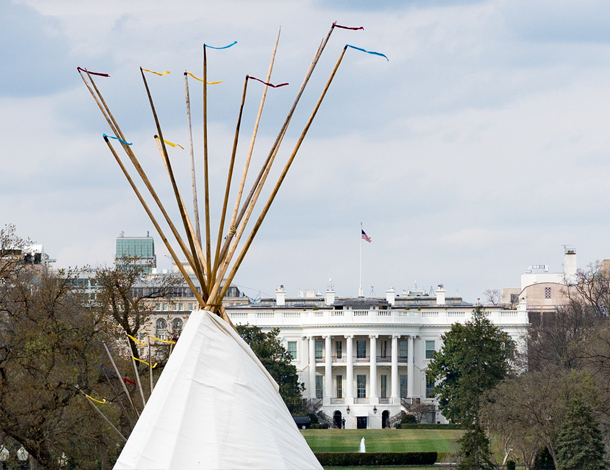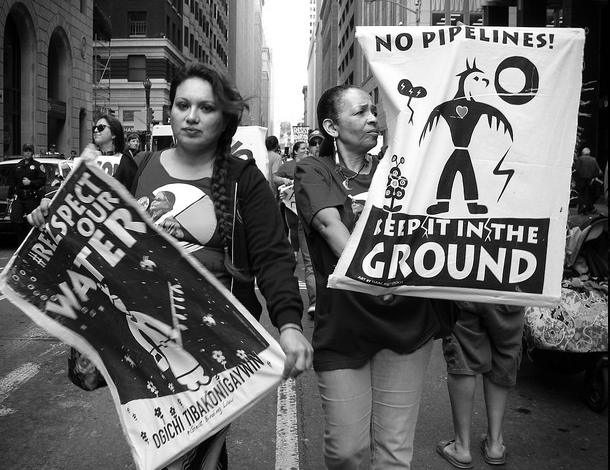Indigenous activist Judith LeBlanc calls it the Standing Rock moment.
Speaking on the historic, four-month convergence of elected leaders from over 400 tribal governments at Standing Rock last year, which resulted in the largest direct action in US history and was followed more recently by the thousands-strong Native Nations Rise march on Washington, DC, the Director of Native Organizers Alliance and member of the Caddo Tribe of Oklahoma described it as a historic, “magic movement moment in Indian country.”
“It is one of the greatest moments of social uprising that we have ever had,” LeBlanc told participants at a parallel event on feminist resistance to extractivism at this year’s Commission on the Status of Women (CSW).

For those grappling with how to advance women’s economic empowerment in a moment of growing economic and political crisis, the importance of seizing on the opportunity within such moments is crucial.
Because the stakes are high
Contextualizing the Standing Rock moment in a description of the construction of the Dakota Access Pipeline (DAPL) which threatens the drinking water of 17 million people, LeBlanc commented, “We are up against an [American] administration in which the fossil fuel industries are in the driver’s seat. They sit in almost every arm of the government.”
In recent years, AWID and the Solidarity Centre have done extensive work demonstrating the global impact of corporate land-grabs and the for-profit extraction of natural resources on women’s economic, social and cultural human rights.
For example, water privatization leads women and girls in impoverished households to travel longer distances to find free sources of water and poses health risks as households turn to water that is not treated and may contain water-borne diseases. There is a long history of failed water privatization programs – between 2000 and 2014 there have been 180 cases of water remunicipalisation in both the global North and South. Universal access to safe and clean water results in reduced time, health, and care-giving burdens for women, as well as increasing privacy and reducing the risk of sexual harassment/ assault while gathering water.
Yet, as Naomi Dedei Otoo from Ghana’s Public Utility Workers' Union of Trades Union Congress and Chair of PSI Africa Women's Committee pointed out in another CSW session, in most countries in Africa, water is privatized, and that access remains out of reach for many women. Dedei Otoo called for a rejection of all forms of water privatization and commodification and urged states to use tax-payers’ money to deliver universal access to safe, clean and reliable drinking water.
“Water is life,” said Dedei Otoo. “We need to reclaim it.”
But despite these seemingly monolithic challenges, LeBlanc and other participants such as Charo Mina-Rojas, Afro-Colombian territorial, human rights, gender and peace activist and National Coordinator of Advocacy and Outreach for the Black Communities’ Process (Proceso de Comunidades Negras- PCN) remained insistent on three points:
- the long-range view of oppressive systems and the movements that resist them,
- the critical importance of continuing mobilizations across and on a variety of fronts, and
- finally, and very simply, the need to come from, and hold on to, a place of hope.
Noting centuries-long struggles against capitalism, racism and patriarchy in Colombia, the Americas and globally, Mina-Rojas acknowledged, “We don’t have a lot of peace and freedom.”
“But we have a lot of hope.”
LeBlanc echoed this hope, speaking also to the power of solidarity across communities and movements
“This is a moment where we are being seen. That we exist. That our people and our cultures are resilient.”

The impact of this mobilization has been tangible
LeBlanc pointed out that within the last three months, billions of dollars have been divested from 17 banks that are invested in energy transfer plans. “We’re getting to the root of the problem,” she remarked, “and that is treating land and air and water as a commodity, rather than a sacred part of our lives which we must live with in harmony.”
In the end, the call by feminists, labour, tax justice, environmental, Indigenous and Sexual and Reproductive Rights (SRHR) advocates’ - and all of those who wear more than one of those hats - to connect and ally more strongly across traditionally separate sites of struggle in this moment of rising global crisis may be one of the most important take-aways from this year’s CSW.
“Coalitions come and go,” LeBlanc observed. “People come together and they may work on a piece of legislation, or stopping one pipeline. But movements are forever. And movements have their own logic, they go up and down. We will go into a lull. Our challenge is how to create infrastructure that keeps people moving in the same direction.”
The strength of that infrastructure and those cross-movement alliances may be what will lead to more Standing Rock moments for human rights and gender justice movements around the world.
